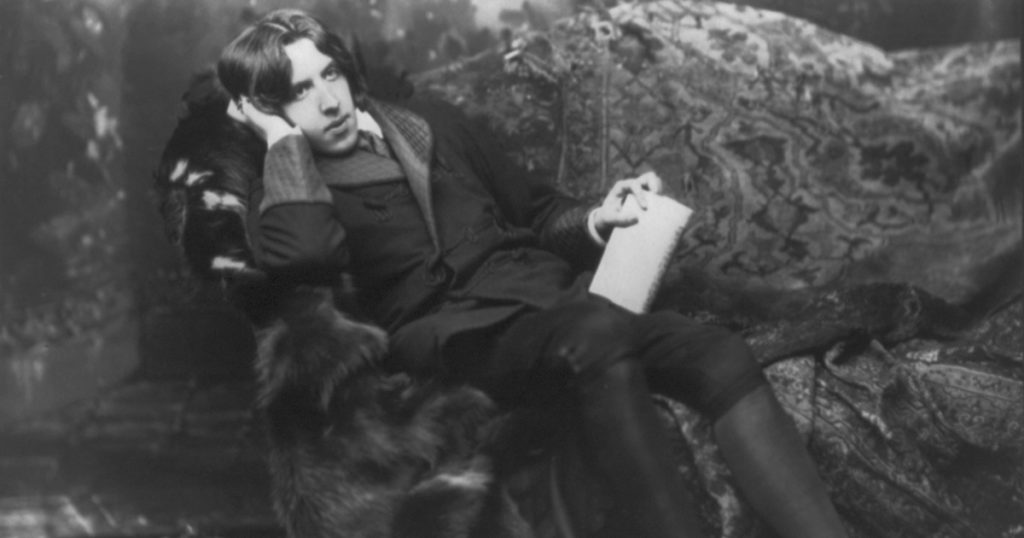Making Oscar Wilde
An excerpt from Michèle Mendelssohn’s account of the writer’s early life and rise to fame

Before he became a bright star in the literary sky, Oscar Wilde was a flamboyant young celebrity with a sense of style and a penchant for the well-timed bon mot. Known for his distinctive dress, Wilde cultivated a reputation as an influential aesthete with pronounced opinions on everything from clothing to interior design. In this excerpt from Michèle Mendelssohn’s latest book, Making Oscar Wilde, the future author arrives in New York at the start of his North American tour to find that his reputation had preceded him in some surprising—and ultimately flattering—ways.
3 January 1882, New York. Legend has it that on his arrival in the United States, Wilde breezed through customs and said to officials, ‘I have nothing to declare but my genius.’ We have no proof that he said this because the anecdote was first ‘recorded’ thirty years later. We can be certain, however, that the New York newspapers—the Sun, the Herald, the Times, and the Tribune—were keen to get a soundbite from Wilde as he emerged from the SS Arizona wearing a felt hat and a huge cape that billowed in the wind. Interviewers jostled towards him, questions at the ready.
‘How old are you?’ one enquired.
Twenty-six, he said, shaving a year off his real age. ‘What are aesthetics?’ another journalist asked.
Wilde name-dropped his favourite artists and poets including Edward Burne-Jones, Dante Gabriel Rossetti, William Morris, Algernon Swinburne—the men who had established the Aesthetic Movement’s credentials. Before long, the reporters turned to personal matters.
‘When do you get up in the morning?’
‘Do you like eggs fried on both sides or only on one side?’
‘Do you trim your finger-nails in the style of the Empress of Japan?’
He had arrived in the land of accelerated intimacies and instantaneous familiarity. The press had never examined him so closely before. In England, newspapers were only ‘dreary records of politics, police-courts, and personalities,’ Wilde wrote in a letter.
After the barrage of interviewers, there were throngs of men and women pressing forward, eager to have a look. Of course, he looked back, and was curious to find out who the American people were. New York City was then the biggest city in the United States with a population of more than 1.2 million. The United States counted over fifty million people—twice the population of England and Wales, or ten times the population of Ireland. America was a crucible of humanity. A stirring song about the melting pot revealed its ingredients to the tune of Patience:
If you want a receipt for the mystery national, Known to the world as the American—
Take all the elements cranky, and rational, Found in each nation and climate and clan:
The pluck of the Britisher, dashing and metally, … Rollick of Irishman, German solidity …
Chinese rapidity, Tatar vitality, African jollity, Japanese oddity, … Zuluish strategy, Grecian address, …
Language Shakespearean, spoken quite nasily, … Arabic luxury, western elan,
And the mixture of all is the American.To Wilde, it seemed that even walking down the street would be a different experience here. Policemen held the crowds back so that he could clear a path through them. ‘It is delightful to be a petit roi,’ he wrote to his confidante Mrs Betty Lewis, the wife of his solicitor. On pale-blue paper (the colour favoured by royalty), he explained that he felt he had become a prince and the gawkers his adoring subjects. Referring to the Prince of Wales, he told Mrs Lewis, ‘I now understand why the Royal Boy is in good humour always.’ Wilde felt like he had conquered the United States and added it to his dominions. Before long, he fancied the entire world would be his.
From MAKING OSCAR WILDE by Michèle Mendelssohn. Copyright © 2018 by Michèle Mendelssohn and published by Oxford University Press. All rights reserved.


